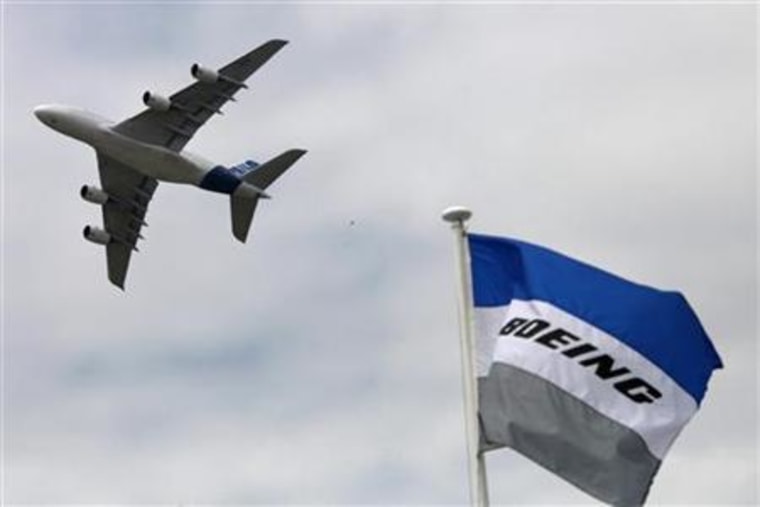In a major victory for Boeing Co., the World Trade Organization sided with the American aviation giant Friday in finding that European countries have provided billions in illegal subsidies to chief competitor Airbus.
The preliminary ruling by the Geneva-based WTO, although expected to be challenged by the European Union, could begin to shake up the $3.2 trillion global market in new jetliners, in which Airbus has overtaken Boeing. The next shoe to drop will be a decision that may well go the other way: The international trade body will rule next year in an Airbus challenge to what it sees as unfair U.S. government support for Boeing.
Friday's decision confirms a complaint by the United States, filed in 2004, that "all Airbus aircraft have received illegal subsidies and that these have caused material harm to Boeing," said Rep. Norm Dicks, D-Wash., among those briefed by U.S. trade officials on the yet-to-be released decision.
Another Washington state lawmaker, Democratic Rep. Jim McDermott, said, "We learned in a WTO ruling that Airbus has enjoyed an unfair competitive advantage over Team Boeing for decades."
Boeing is headquartered in Chicago, but has extensive plane-building operations in the Seattle area. Lawmakers from other states with links to Boeing, also confirmed the decision.
The WTO finding was the first step in a process that could take years to produce a final result.
The organization doesn't have the power to impose sanctions itself, but it can allow a nation that has been harmed — in this case the U.S. — to raise tariffs or impose other barriers to imports from an offending country or countries.
And that wouldn't be limited to aircraft. It could also include, for instance, purses, sweaters or French wines. The amount of such tariffs could be high enough to offset the damages done by the illegal practices.
Victory for the U.S.
While this was a clear victory for the U.S., analysts suggested it reflected not the current world, in the grips of global recession, but the business world as it stood five years ago when open trade was the rule and anticompetitive, protectionist practices generally denounced.
Since then, hundreds of billions in dollars and euros have been spent in government subsidies and takeovers of failing banks and automakers here and in Europe in an effort to combat the worst global downturn since the Great Depression.
Furthermore, other countries, including China, Japan and Brazil, are busy expanding or developing their domestic airline industries.
The American case protested "launch aid," easy-term loans that were extended primarily by France, Britain, Spain and Germany to help Airbus develop new jetliners as it overtook Boeing as the world's top producer of commercial airplanes.
"The United States has always maintained that the European governments have provided unfair subsidies to Airbus that harm U.S. interests," said Deborah Mesloh, deputy assistant U.S. trade representative in Washington.
"Today's ruling begins the process of creating an environment for establishing clearer rules on aircraft subsidies," said John Veroneau, an international trade lawyer who was general counsel of the U.S. Trade Representative office in 2004 when the case was initiated.
However, the EU counter case against the United States — with a ruling expected in about six months — could find that the U.S. was also engaging in illegal trade practices in helping Boeing, including contracts awarded by the Pentagon and NASA.
"We have a good case against them, and they have a serviceable case against us," said Jeffrey Schott, a trade expert with the Peterson Institute for International Economics.
Global aviation battle
Both disputes in the Boeing-Airbus rivalry are over what is projected to be a $3.2 trillion global aviation market over the next 20 years.
Sen. Maria Cantwell, D-Wash., said the case "sets an important precedent that must be respected by all countries with an emerging commercial aircraft industry." She also said it should discourage European governments from going ahead with an additional $4.6 billion in proposed subsidies for Airbus to develop its new extra wide-bodied A350 airliner, which will compete with Boeing's long-delayed 787 Dreamliner.
Wall Street seemed unsurprised by the WTO ruling. Wayne Plucker, manager of Frost & Sullivan's North American aerospace research, said well-developed areas like the U.S. and the EU "don't really need subsidies."
The U.S. should require Airbus to divest itself from any illegal subsidies used to finance bids for government contracts, including its offer for a $35 billion aerial refueling tanker for the Air Force, said Paul Shearon, secretary treasurer of the International Federation of Professional and Technical Engineers.
Airbus' parent company, European Aeronautic Defense and Space Company N.V., is partnered with Northrop Grumman Corp. in competing against Boeing on the tanker deal.
Both Boeing and Los Angeles-based Northrop have been competing for years over the tanker contract that could surpass $100 billion over two decades.
